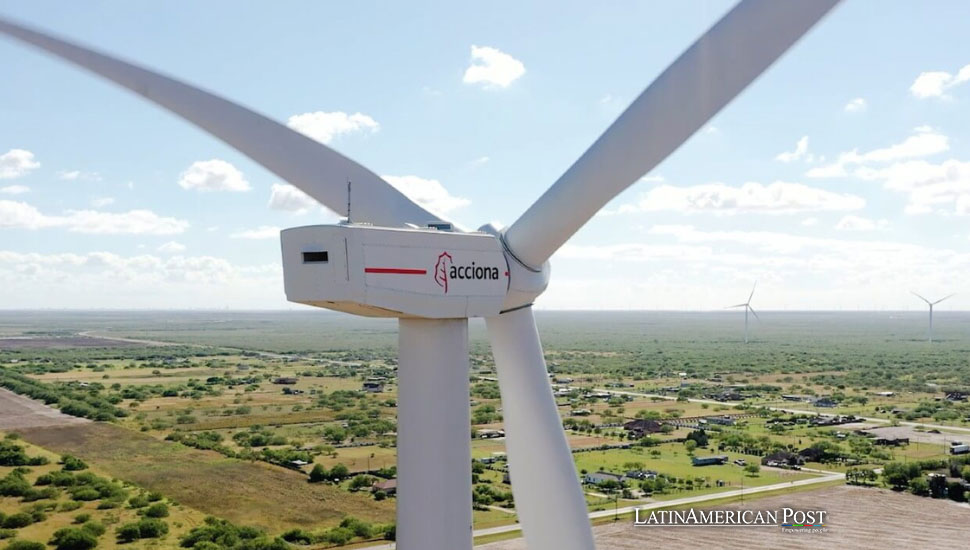Acciona Energía Quits Chile’s Renewable Energy Group Over Industry Stalemate

Acciona Energía, one of the founding members of the Chilean Renewable Energy Association (Acera), has announced its departure from the organization, citing a lack of progress in addressing critical issues in the renewable energy sector. The company claims that Acera has shifted its focus to favor a specific industry segment, hindering Chile’s much-needed energy transition.
Acciona’s Decision to Resign from Acera
Spanish multinational Acciona Energía has made a significant move by stepping down as a member of the Chilean Renewable Energy Association (Acera), where it had played a foundational role for over two decades. The company’s resignation, marked by disappointment and frustration, stems from what it perceives as Acera’s recent failure to uphold its original mission: to support the growth of renewable energy across all scales and ensure a competitive, fair market for clean technologies.
In a letter obtained by EFE, Acciona outlined its concerns, stating, “In recent months, Acera’s actions have focused on favoring the interests of a specific segment of the industry, abandoning the urgent need to address the critical issues facing the renewable energy sector as a whole.” This criticism highlights the company’s discontent with Acera’s direction, which, in its view, contradicts the organization’s core mission of fostering a balanced, fair, and competitive market for renewable energy technologies.
The letter continues, explaining that the decision to resign was not made lightly. “After a thorough analysis, Acciona Energía has decided to submit its resignation from Acera, an organization we helped found more than 20 years ago.” Despite the long-standing relationship, Acciona felt compelled to take this step, marking a turning point in its involvement with Acera and, by extension, the broader renewable energy landscape in Chile.
A Call for Urgent Energy Reforms
Acciona’s resignation sheds light on a deeper issue: the regulatory challenges and stagnation in Chile’s renewable energy sector. The company’s letter was not just a statement of departure but also a call to action, urging for significant reforms in the regulatory framework that governs the industry. The letter reads, “Unfortunately, Acera has become another voice in the chorus resisting change, precisely at a critical moment when the challenges of the energy transition and the crisis affecting many renewable energy companies demand profound modifications to the current regulatory framework.”
Despite being a global leader in renewable energy adoption, Chile faces a pivotal moment. Many companies, including Acciona, believe the current regulatory environment is insufficient to support the country’s ambitious goals for a carbon-neutral future. Without changes, these companies argue, the renewable sector will continue to struggle under the weight of outdated policies, which stifle innovation and delay the energy transition.
Acciona’s exit from Acera signals its belief that the association is not doing enough to push for these necessary reforms. The company’s frustration is evident: Acera’s reluctance to advocate for broader changes, which would benefit the entire sector, has led to a stagnation that Acciona feels it can no longer support.
Acciona’s Continued Commitment to Renewable Energy in Chile
Despite its departure from Acera, Acciona remains committed to advancing Chile’s energy transition. The company has been a critical player in the country’s renewable energy sector since 2006, with numerous wind and solar projects that have significantly contributed to the country’s clean energy portfolio.
Among its most notable projects is El Romero Solar, the largest photovoltaic plant in Latin America, located in the Atacama Desert. This groundbreaking project and other solar ventures like the Usya and Almeyda plants have positioned Acciona as a leader in solar energy generation in Chile. In addition to solar, the company has also made strides in wind energy, with projects like the San Gabriel wind farm in La Araucanía, further diversifying the country’s renewable energy sources.
In its letter, Acciona emphasized that its commitment to Chile’s energy transition remains unchanged. “We will continue to work to accelerate Chile’s transition to a carbon-free economy, promoting a stable and predictable regulatory framework that encourages investment in a competitive and non-discriminatory market for the sustainable development of the energy sector in the country,” the company stated.
This declaration underscores Acciona’s determination to pursue its renewable energy initiatives even as it distances itself from Acera. The company fosters a regulatory environment that supports long-term sustainability and competitiveness, which it sees as critical to meeting Chile’s ambitious energy goals.
Challenges and Controversies Surrounding Major Solar Projects
While Acciona continues to drive renewable energy initiatives in Chile, it has faced challenges, particularly with large-scale projects like the Cerro Dominador solar plant. As the first Concentrated Solar Power (CSP) plant in Latin America, Cerro Dominador was a landmark project intended to demonstrate the potential of CSP technology. However, the plant has been plagued by technical issues, including problems with its molten salt storage tanks, preventing it from operating for over a year and a half.
Acciona, one of the contractors involved in constructing Cerro Dominador, has been at the center of the controversy surrounding the plant’s operational delays. The issues with Cerro Dominador have highlighted the technical and logistical challenges of implementing innovative energy solutions on such a large scale, particularly in a country with a landscape that is as diverse and challenging as Chile.
Despite these setbacks, Acciona remains optimistic about the country’s potential for large-scale renewable energy projects. The company is involved in several other high-profile ventures, including the Punta Palmeras wind farm and the Tama te Ra’a photovoltaic plant in the Pacific Ocean. These projects represent a significant portion of Chile’s renewable energy infrastructure and reflect Acciona’s ongoing commitment to expanding the country’s clean energy capacity.
As Chile grapples with the challenges of transitioning to a fully renewable energy grid, companies like Acciona will play a crucial role in driving innovation and investment in the sector. The company’s decision to leave Acera may signal frustration with the industry’s current state. Still, it also represents a continued dedication to pushing for the reforms necessary to ensure a sustainable and competitive future for renewable energy in Chile.
Also read: Crime Surge Threatens Chile’s Tourism Business and Global Appeal
Acciona Energía’s resignation from Acera marks a significant moment in Chile’s renewable energy sector. It highlights the growing frustration among industry leaders with the current regulatory framework and the need for urgent reforms to support the country’s energy transition. Despite these challenges, Acciona remains committed to driving Chile towards a carbon-free future, continuing its work on several major renewable energy projects nationwide. The road ahead may be filled with obstacles, but with companies like Acciona leading the way, Chile’s renewable energy sector has the potential to thrive in the years to come.




